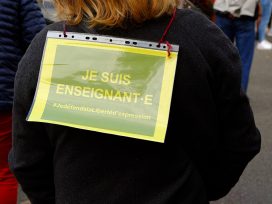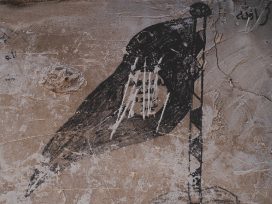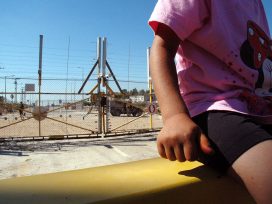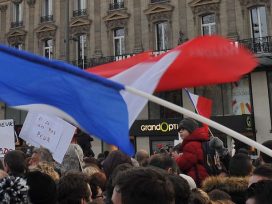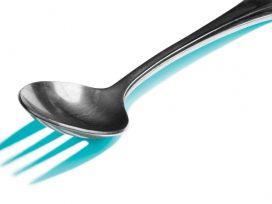Marek Seckar: To start with, simply tell me how it happened. How did you become guerilla fighters?
Karl-Heinz Dellwo: I was born in 1952 in West Germany and I grew up in a society which was totally permeated with Nazi ideology. Of course, the country wasn’t officially Nazi, but there were still many people, in very important positions, who were closely connected with the former Nazi régime and who were not punished or even forced to reflect upon their past. When you start to realize these things, you also become aware that you don’t like those people, that they actually embody everything you hate. You realize that you don’t want to have anything to do with them and that if there’s any prospect of creating a new, better society, these people must simply leave.
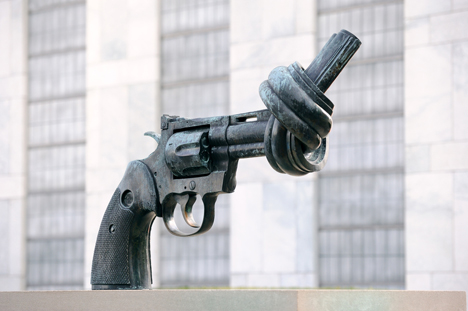
“Non violence” by Carl Fredrik Reuterswärd. Photo: Songquan Deng . Source:Shutterstock
Gabriele Rollnik: Another thing you have to understand is the international context of that time. The Vietnam War was raging and the German government cooperated quite overtly with the most brutal dictators. Germany had friendly relations with the régime in South Africa, with the fascist dictatorship in Greece, played a role in deposing Sukarno in Indonesia. We couldn’t accept this and we demanded a change.
MS: Did you think it’s appropriate to respond to this situation by detonating bombs, hijacking planes and kidnapping people?
KHD: This happened much later. When the protest movement emerged in the 1960s, it was completely non-violent, consisting mainly in meetings and strikes. We didn’t start the violence. The first shooting occurred in Berlin in 1967 when the student Benno Ohnesorg was killed by the police during a peaceful demonstration. One year later, student leader Rudi Dutschke was shot by a right-wing extremist and barely survived. It is very likely that the shooter was inspired by the anti-left campaign which was taking place in right-wing media, especially in Axel Springer’s tabloid Bild. These events led some left-wing activists to think that peaceful protests were pointless, but that there was a small chance that armed struggle could appeal to society and bring about a real change. That’s how the urban guerilla concept emerged in 1970. It actually wasn’t a new idea. There was armed struggle going on in many places around the world – In Bolivia, Vietnam, Angola, Rhodesia and so on. This way of trying to achieve a political change was simply considered legitimate at that time.
GR: We wanted to bring all these struggles together and fight in the belly of the beast, which was Germany and western Europe, the heart of world capitalism. Germany was also a frontier state which played an important role in the politics of the United States, the country which was most opposed to communism. We believed that if we could trigger a revolution in the West, it would later spread around the world, including the Eastern Bloc countries.
MS: How did you see the socialist countries of eastern Europe? Were they for you an example to follow?
GR: “Real socialism”, as it existed in eastern Europe, wasn’t a way for us. On the other hand, I remember that when I studied at the Free University of Berlin in 1968, we were much impressed by the Prague Spring and we hoped that Alexander Dubcek would bring about some important change.
KHD: I remember that my comrade Lutz Taufer, later a member of the Holger Meins Commando who was with us when we sieged the German embassy in Stockholm in 1975, went to Prague in 1968 to study this new movement. We saw the Prague Spring as another stage of the world socialist revolution. As concerns the political system of real socialist countries, we admired Lenin and the Bolshevik revolution of 1917, for us it was a very important step for the whole world, but its value was later lost because of Stalin and his atrocities. Stalin definitely can’t be linked to emancipation and other values we professed. So we rejected later developments in Russia and other eastern countries. On the other hand, there was Hitler in Germany at that time, and you probably need someone like Stalin to defeat Hitler. So we certainly didn’t want to emulate the Eastern Bloc in Germany; on the other hand, we believed that its existence would help us bring an end to the capitalist system.
MS: And how did you see Germany and German society after the revolution you wanted to initiate? Did you have any specific goals?
GR: We were rather idealistic. We didn’t have any goals besides that of weakening imperialism… We really didn’t want to be anything but a trigger and we believed that we would inspire the people to rise up and create a truly free society. Of course, there were examples to follow, such as the Paris Commune or the program of the Kronstadt rebellion, suppressed by Trotsky in 1921. Another inspiration was the system of democratic self-government as it was practiced in Yugoslavia. We wanted to achieve communism from the bottom, not from the top of society.
KHD: But in general, we thought there wasn’t really an example we could follow unconditionally. On the contrary, we wanted to find a new way and create a new example. Just like Salvador Allende in Chile, who said in one of his speeches that even though there was a lot of experience in the world, it wasn’t really possible to repeat it because the process of human emancipation always starts anew.
MS: Were you ever in contact with the German communist party? Was there any kind of co-ordination or at least sympathy between your groups and them?
KHD: The situation in Germany was somewhat specific. The Communist Party played a prominent role in the resistance against the Nazis. It was quite strong just after the war, but was banned in the 1950s. A new communist party was founded legally in 1968, but that was an organization with strong links to GDR. They were dogmatic and not really independent; their headquarters was in East Berlin. That wasn’t acceptable to us.
MS: And how were your activities perceived by the German communist party itself?
GR: They hated us too. A good example is Ulrike Meinhof, one of the RAF first generation leaders, who was turned in to the police by a German communist party member.
MS: Still, you adhered to the Marxist theory as the best basis for the political change. You may have rejected Stalin, but you embraced Mao, even though the results of his concept can be hardly described as less disastrous than Stalin’s…
GR: We couldn’t know that at that time. Even though we basically rejected the system of “real socialism”, we still thought that many things were better there than here. Social discrepancies were not so huge; there was work and housing for everybody. The governments were authoritarian, and we couldn’t agree with that, but we believed this would change soon.
KHD: We really admired Mao and the Cultural Revolution in China. But you have to realize that our knowledge of the events was very limited. All we saw were young people who were – as we thought – trying to reform the system from within. This way was impossible for us, though. We didn’t believe the capitalist system could be reformed from within; we could only break with it and attack it from the outside.
MS: So you embraced armed struggle as the motor of change…
KHD: As I see it now, we might have been the last wave of the workers’ emancipation movement which started perhaps with the Paris Commune and went on through the revolution of 1905. At that time, we believed we were just one of the many waves of this current and that we would have followers. But the times have changed. We were probably the last front. It wasn’t only Stalin and his atrocities which brought about this realization. The turning point was possibly what happened in Cambodia under the Khmer Rouge government. We never expected that such crimes could be possible. Maybe it was this experience, this knowledge which made us realize the facts.
MS: So how exactly did you end up joining the armed struggle against capitalism?
KHD: In the late 60s, it was practically impossible for a young person in West Germany to avoid radical student movements. Even though I grew up in a small town, I first attended demonstrations in 1968 when I was sixteen. These were protests against schooling policies and the war in Vietnam. Later, I moved to Hamburg which was politically a very vibrant city. I took part in demonstrations and lived in a squat. In 1973, the police raided our squat and I was sentenced to one year in prison. I was an angry young man and the harsh conditions in prison led me to break with this society entirely. I simply didn’t want anything to do with those people, those politicians, former Nazis; I couldn’t stand this society, which was involved, again, in the crime in Vietnam. At that time, the RAF had existed for three years. I thought it was a good thing: armed struggle seemed logical and justifiable. So it happened that I became a member of the RAF and participated in the siege of the German embassy in Stockholm in 1975.
MS: Was that your first operation with the RAF?
KHD: Yes, this was my first engagement within the RAF’s ranks. We called ourselves the Holger Meins Commando, after a comrade from the first generation of RAF fighters who died in prison while on hunger strike a half year before.
MS: So you went to siege the German embassy in Stockholm and take the staff as hostages. You demanded that all the RAF prisoners be released from prison; otherwise you would start killing the hostages one by one. Did you receive an order from the RAF’s command to do that?
KHD: This is not how the RAF worked. We were an independent cell and we made our own decisions. We informed some other people about our intentions, but the idea was all ours.
MS: I still find it difficult to understand why you opted for such an extreme act…
KHD: In 1975, the people from the RAF’s first generation had been in prison for three years and longer. They had followers, but the police were very successful in detecting their plans. The movement was dying out. Our opinion was that something had to be done. We wanted to free all political prisoners. Two months before, another armed group liberated five prisoners following an operation, about which Gabriele can say something.
GR: Yes, at that time, I was a member of the anarchist organization Movement 2 June, called after the day on which the student Benno Ohnesorg was killed by the police in 1967. In 1975, we kidnapped the West Berlin mayoral candidate Peter Lorenz. We conditioned his release on the liberation of several captured left-wing fighters. The government yielded and the prisoners were successfully flown to South Yemen whereupon Lorenz was released too.
MS: Did you believe the siege in Stockholm would go the same way?
KHD: We were not sure at all. But we thought, we had to act now. We were simply convinced that this system, which we called technocratic fascism, would destroy everybody who wouldn’t be able or willing to integrate. This, by the way, wasn’t just our fantasy. Remember that I had spent a year in prison – with all the bad things included: beating, solitary confinement… – for nothing more than squatting. And there were our comrades in prison, and we believed that if they were not liberated they would all die. So there was only one way for us. But the operation failed. The government refused to negotiate with us. We killed two people. Then two of our comrades died in an accidental explosion. And the rest of us were caught.
MS: Had it occurred to you that it could turn out so badly? How detailed were your plans?
KHD: The operation corresponded to our capabilities at that time. We were only a few comrades, without experience in illegal armed struggle. But we had a big goal and knew that we had to put all our eggs in one basket. We thought that we would either win, i.e. that our comrades would be liberated, or that we would die. At the same time, we saw the latter possibility as a victory of sorts too, because if we died we would never be absorbed by the system we hated. I also remember that the head of German police at the time, Horst Herold, was really happy about the situation: now they are in a closed place, they will never escape, we’ll get them. From the beginning they wanted to resolve the situation militarily. That was an expression of the entire social relationship between us and them from the beginning of the revolt: we were to be completely annihilated. We had to deal with the former war-generation.
MS: Again, I can’t understand how there could be a reason for so much hate…
KHD: I can tell you a story which might shed some light on that situation. In 1969, protesting students stormed and occupied the institute of the philosopher Theodor Adorno. He called the police to get rid of them – something absolutely unexpected from a man like him. Later, in a conversation he had with Herbert Marcuse, Marcuse told him: Yes, I agree, they are politically wrong, they are terribly impetuous, but you have to realize that for those young people it’s absolutely impossible to live in this system. And that was true. As we saw it, we could either win or die. Either we would initiate a revolution, or we would sacrifice our lives. Because we didn’t want to be in one ship with those Nazis and capitalists, people who were once again taking part in mass killing, now in Vietnam…
MS: Is that really what Germany was like at that time? From behind the Iron Curtain, it looked more like an unattainable paradise…
KHD: It’s difficult to understand it today. Nowadays, Germany looks like a normal liberal capitalist democracy, but it really wasn’t the case thirty years ago. Those former Nazis were everywhere. Take, for example, the entrepreneur Hanns Martin Schleyer whom the RAF kidnapped and then killed in 1977. During the war, he was an important member of the Nazi party, with a high position in Prague, among other places. He took an active role in the Holocaust. He lived in a huge villa stolen from a Jewish couple. The woman died in Auschwitz and her husband was killed in the concentration camp of Mauthausen. Then, after the war, Schleyer became one of the country’s leading entrepreneurs and industrialists, an enormously powerful personality. And there were people like him all around us – in economy, in politics, in the police, in the justice and in the media. You can only understand our armed struggle if you see it from this perspective.
MS: How did the people in Germany see your activities?
GR: Especially at the beginning of our struggle, in the early 1970s, we enjoyed a lot of support. At one point, about thirteen percent of the population declared they would provide shelter to the RAF fighters on the run. But later this attitude changed and we felt more and more isolated.
MS: What exactly caused this change?
KHD: On the one hand, the medial campaign the government staged against us was successful. They spread rumours that we were putting bombs in kindergartens and football stadiums. In 1975, two bomb attacks took place in Hamburg’s railway station and a declaration appeared, supposedly on the RAF’s behalf, claiming responsibility. I can’t prove anything, but I’m convinced it was all staged, probably by the secret police. On the other hand, it’s also true that we were isolating ourselves from the people. We stood against the war in Vietnam, colonialism, the Nazis, etc., but it was all negativism, and we were unable to create a specific positive vision. We had no political program and our ethos was anchored back in the 1960s. But the time had changed. The country was getting rich, the people were earning a lot of money, they were satisfied and believed it would last forever. A huge divide started to appear between us and the majority population.
GR: And we really failed to gain more people for the movement. We were devoted to the armed struggle, but that’s not the way for everyone. We were unable to create a broader movement with more possibilities for different kinds of people.
MS: Did you at least try? Were you actively approaching the working class? Did you have a propaganda strategy?
GR: Our movement at least tried to do this; we were distributing flyers and trying to explain our cause. But, as Karl-Heinz says, things were getting better for the working class and our materials didn’t have much impact. And we also lost the support of the intellectuals. Our operations were becoming too extreme, inacceptable for most people. Even the people on the radical left, who had supported us at the beginning, changed their minds after Stockholm or after Schleyer’s kidnapping. These people formed the Green Party which became part of mainstream politics.
MS: Going back to your background and motives – South African journalist Jillian Becker claims in her 1977 book Hitler’s Children that the RAF’s activities were actually a legacy of the Nazi régime in Germany. Can you comment on this interpretation?
KHD: When you look at different forms of armed struggle in the West, you’ll notice that most violence took place in countries with Nazi or fascist heritage, as in Italy, Germany and Japan. But I think it would be very misleading to interpret this fact as some kind of Nazi legacy. If there is any unequivocal explanation, then I rather believe that the experience of our country only made our reaction all the more violent. In other words, that our violence wasn’t a consequence of, but rather a reaction to the presence of Nazism in German society. No, we definitely weren’t Hitler’s children. It seems to me that Becker used this pretext to marginalize us in the context of different left-wing movements. Her stance was that there is one permissible, legitimate way of leftist thinking, and everything beyond that line is actually fascism, cannot be integrated into society and consequently must be destroyed. And what’s easier in this respect than to label us as Hitler’s children? This is, unfortunately, a common phenomenon on the Left: a lot of dogmatism and single-mindedness.
MS: Let’s now leave politics aside. How did you see yourselves personally? My feeling is that there was also a lot of romanticism. You probably saw your RAF forerunners as heroes, and you wanted to become heroes too…
KHD: I don’t think we wanted to be heroes. As I see it now, I am proud – in a way – that I took part in the armed struggle of the 1970s. I think it was a good decision, good for my moral and political health. On the one hand, there was a strong need for a political change, and I believe this need was legitimate. On the other hand, all the existing ways of change had been discredited. Real socialism didn’t work, communist parties had lost their credit, and it seemed pointless to go to workers with flyers and try to indoctrinate them. A new way needed to be found. I was one of those who were looking for this new way. So I subscribe to this decision. But later, in practice, we did much wrong.
MS: When did you realize your way was wrong?
KHD: Maybe after 1977 – when my comrades died in the Stammheim prison, and when the Landshut airplane was hijacked. This operation was morally and politically stupid, but I still took part, I was actually one of those the hijackers were trying to liberate. Of course, I had doubts before, I knew we were making mistakes, but I believed that the course was right. Then I realized the mistakes were too many and I wasn’t really sure about the main course. The problem is, at one point it’s impossible to turn back. You have to go on and believe that things will change, maybe in ten or twenty years, but they will. But it never happened. In the 1980s, I realized that the RAF was still able to carry on, to rebuild itself, there were new fighters arising in every generation, but it was always on a small scale, little isolated groups with no real impact. We could have gone on like this for another fifty years, but it would have led nowhere. That’s why in the late 1980s many people started looking for a way out. Then of course, in 1989, the Soviet bloc collapsed and this caused a major disruption on the Left in general. Which is strange – because there were few people on the left who actually claimed allegiance to the Soviet system. But the feeling was that leftist thinking and identity as such were dead, that the change we were dreaming of was unattainable. In fact, capitalism was spreading around the world. On the whole, there was a lot of depression in leftist circles and it affected my thinking too. Our vision was fading out.
MS: This inconclusive ending was perhaps logical. You had no specific goals and your operations were not well prepared. Even Lenin would have rejected this strategy as mere anarchism. In his opinion, the essential thing was to build a strong disciplined organization and wait for the right moment…
KHD: But in 1970, we thought it was the right moment. We were wrong, but the thing is, once you think it’s the right moment you must act. Nobody knows beforehand whether the moment is right. I am glad that we tried.
MS: But Lenin was also able to back away. In 1905, he thought it was the right moment and he acted. Then he realized it wasn’t and he went back to Switzerland and waited for another 12 years…
KHD: We were obviously more radical than Lenin…
GR: And you mustn’t forget the role of forerunners. Lenin had forerunners and maybe we were forerunners too. You can’t exclude that the revolution will come one day. In fact, it is logical – if you take a look at today’s world, it’s clear that capitalism can’t work forever. I believe that the future revolution will be more intelligent than what we were trying to achieve. The people will profit from our experience and also from that of Soviet socialism. This way, they will be able to create a more perfect vision. You have to know what works and what doesn’t, but the goals – freedom and emancipation – remain the same. It is possible that the people are still not good enough for such a great change, but maybe they are better than we were.
KHD: Gabriele is an optimistic woman.
MS: Do you really think people can learn?
GR: They can learn, of course.
KHD: I’m not sure about that; it rather seems to me that they repeat their mistakes over and over.
MS: Gabriele, can you tell me something about your own story? You mentioned the case of Peter Lorenz and his kidnapping. What happened next?
GR: As I said, that operation was successful. But about half a year later we were all captured and I went to prison. It wasn’t the notorious Stammheim prison in Stuttgart where most RAF prisoners were kept, but a women’s prison in West Berlin where the conditions were not so harsh. Less than half a year later, in June 1976, we escaped. There were four of us, three June 2 members and one woman from the RAF. For two years, I lived undercover in Germany and other West European countries and was fighting, once again, with my comrades from the June 2 movement who were still free. In 1978, we carried out an operation in the prison of Berlin Moabit to free another prisoner. Together, we decided to go to Palestine where we had contacts and where we wanted to spend some time and get military training. But we were caught on the way, in Bulgaria. We tried to apply for political asylum, but the Bulgarians didn’t even talk to us and they handed us over to the German police. I remember when we were getting into the plane, Günther Scheicher, the head of the police unit which was responsible for the transport hailed us saying “Heim ins Reich!” (“Back to the ‘Reich’ with you!”). Probably a former Nazi.
MS: So you went to prison again?
GR: For fifteen years, not more not less.
MS: But you, Karl-Heinz, were given a life sentence.
KHD: Actually a double life sentence. But in the end, I spent a bit over twenty years in prison.
MS: Why were you released?
KHD: Here it must be said that a life sentence in Germany is never definitive. The case is always reviewed after fifteen years and if you are not considered a danger for society you can be released. I don’t think they would have set us free in the 1980s, but the situation really changed after 1989. There were voices, especially coming from the former left-wing activists, now in the Green Party, saying that this problem had to be finally resolved; otherwise, it would go on perpetually.
MS: I’ve heard that the German government also issued a declaration that they would release the prisoners if the RAF stops its activities.
KHD: This really happened and actually we made a declaration too, I made it for the whole group. Broadly speaking, I said that the world had changed and it was necessary to find a new way because violence wasn’t any longer justifiable. That we would always be left-wing and would always strive for socialism, but if we were released nobody would engage in armed struggle again. I never said anything else.
GR: There was some pressure on us to repent and reject our principles. But we never did that. Actually, if we did, we could have been released much earlier – like some of our former comrades who decided to repent. But that wasn’t an option for us.
MS: How was your life in prison?
KHD: It was hard. I spent more than 17 years in a high-security unit. For two years and a half I was in solitary confinement. After several hunger strikes they put me in one cell with two comrades, and for a short time with four. During my solitary confinement, there was complete silence, no noises from the outside, no possibility to speak with other people. The cell was all white, with burning light. I had visits once a month, but I could only speak with them through bulletproof glass and the guards were recording all our words. There was a list of topics we were not allowed to mention. If the rules were broken, the visits were violently canceled by the guards. Once, the head guard in the prison admitted that the aim of these conditions was simply brainwashing. In fact they wanted me to keep saying “Everything was wrong” and nothing else. Once, I realized that I was forgetting words. It took me a whole day to write a short, six-line letter, and then I saw I made it full of errors. That’s when I became aware that I had to do something. Luckily, we had good lawyers and they helped us communicate with each other, even though we were in different prisons around the country. So we started arranging hunger strikes to protest against these conditions. In total, I was on hunger strike for one year and eight months.
GR: In our case, the senator of justice in West Berlin said that the security unit in the prison of Moabit should work like a “washing machine”. Our lawyers spread information about our lives in prison and we got some support from the public and from our parents. And we presented our demands together. Thanks to that, our situation gradually improved.
KHD: But those hunger strikes were so important for us because it is absolutely essential to do something if you are in such a situation. A hunger strike isn’t easy. At the beginning, I was really scared. My first strike lasted about thirty days and I didn’t know how long I could stand. But I could see the change. Before, I was an object with no room for my own decisions, and now I became an active subject. Even the guards’ behaviour changed. Suddenly, they were afraid; they didn’t know what to do. I was in struggle again and that’s always good. Without the hunger strikes, I would be now either dead or a broken person.
GR: That was by the way the purpose of these conditions.
MS: Did you have any hopes for the future? Did you believe you would be released one day?
KHD: Maybe there was a small hope after fifteen years. Before that, I thought that either my comrades would set me free, or I would stay in prison forever.
MS: Still, when you got out of prison you became very active. Did you have any plans before your release?
KHD: All that happened much later. I didn’t have any particular plans when I was in prison. And when I got out, I was still marked for a longer time by the conditions in prison. But I had some good luck: my friends found a job for me in a social institute where I did some research on the resistance movement in Germany in the early 1960s. This way, I could progress step by step.
MS: How did you get to film?
In this case, I actually made some preparation when I was in prison. We had no TV, but I remember I was making pictures in my head. Later, I could also read a few books about film theory and especially the magazine Frauen und Film which tended to combine Marxist views and psychology in the interpretation of movies. This helped me a lot – not only in filmmaking, but also to understand my own personality. I also read a lot of political theory, mainly Marx. I gradually realized that while Marx is a very good basis for political thinking, it is not sufficient on its own. It is essential to include other views, especially from the domain of psychology and cultural and ethnological studies, to approach the subject from as many points as possible. This is maybe our main task today.
MS: Is this why you founded the publishing house Laika Verlag? Can you say something about your activities in this respect?
KHD: Together with my colleague Willi Baer who has a different political life history than me, we founded the publishing house, named after the first creature to orbit the Earth. An outbreak from a predetermined situation but no arrival in a new world. Maybe it is the same with communism. There have been many attempts so far, but the new world has not yet been created. But it is inevitable. The old world will perish with capitalism. In our publishing house we publish left-wing theory, philosophy, debates and reflections on history since the mid-sixties. In our special edition called , we also publish non-fiction books about revolutionary struggles worldwide from the sixties to the present. This is the most meaningful thing that I can do at this time.
MS: Gabriele, please can you say a few words about your contemporary activities? How did a former guerrilla fighter become a child therapist?
GR: When I was released from prison in 1992 I had to decide how I could earn my living and give my life a meaning. I had studied sociology and political science at university in the 1970s, but I never graduated because of political reasons. So I was without profession. As a student, I had worked with children from proletarian families and liked that very much. So I tried to find a job in this direction. But my first job consisted in providing care to old people. I liked that too, because the old people needed help and my work made sense. After a year, I got the chance, thanks to a friend, to work in a children’s home in Sankt Pauli. I worked there for five years and continued my education with final exams in psychotherapy for children and adolescents and after two more years I also graduated in social sciences. Today I work with families, children and young people.
MS: I’d also like to ask you a personal question. When did you meet each other for the first time? Were you in touch during your lives as guerrilla fighters and later in prison? How did it happen that you are now together?
KHD: During a hunger strike, we were once allowed to make calls. So we only knew each other’s voices. Ella left the prison in 1992, I was released three year later. Together with two other comrades who had been also in the the prison of Celle and left the same year, we organized a “release party” in Hamburg. We rented a ship for seven hours and invited 200 left-wing friends for a cruise on the river Elbe. This is where we met again and we have stayed together ever since. And we like it.
